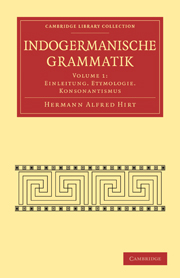Book contents
- Frontmatter
- Vorwort
- Contents
- Literaturangaben
- Verzeichnis der Abkürzungen
- Einleitung
- Erster Teil. Etymologie
- XI. Kapitel Die Lautlehre
- XII. Kapitel Grundgesetze der etymologischen Forschung
- XIII. Kapitel Die Bedeutung der Wörter
- XIV. Kapitel Verwandte und entlehnte Wörter
- XV. Kapitel Verlust von Worten
- XVI. Kapitel Etymologie und Kulturgeschichte
- Zweiter Teil. Der idg. Konsonantismus
- XVII. Kapitel Die Sonorlaute
- XVIII. Kapitel Die Zischlante
- XIX. Kapitel Idg. j und w
- XX. Kapitel Die idg. Tenues und Mediä
- XXI. Kapitel Die idg. Mediä aspiratä
- XXII. Kapitel Die Lautverschiebung
- XXIII. Kapitel Das Hauchdissimilationsgesetz im Griechischen und Indischen
- XXIV. Kapitel Die Gutturalreihen
- XXV. Kapitel Die Tenues aspiratä
- XXVI. Kapitel Sonstige Laute des Idg
- XXVII. Kapitel Konsonantenverbindungen
- XXVIII. Kapitel Die r-Verbindungen
- XXIX. Kapitel Die l-Verbindungen
- XXX. Kapitel Die n-Verbindungen
- XXXI. Kapitel Die m-Verbindungen
- XXXII. Kapitel Die w-Verbindungen
- XXXIII. Kapitel Die j-Verbindungen
- XXXIV. Kapitel Die s-Verbindungen
- XXXV. Kapitel Veränderungen des Konsonantenstandes im Idg. Schwund von Konsonanten
- XXXVI. Kapitel Konsonantenwechsel
- XXXVII. Kapitel Auslautsgesetze
- XXXVIII. Kapitel Der Anlaut
- Autorenverzeichnis
- Sachverzeichnis
- Wörterverzeichnis
XXXVIII. Kapitel - Der Anlaut
Published online by Cambridge University Press: 05 August 2011
- Frontmatter
- Vorwort
- Contents
- Literaturangaben
- Verzeichnis der Abkürzungen
- Einleitung
- Erster Teil. Etymologie
- XI. Kapitel Die Lautlehre
- XII. Kapitel Grundgesetze der etymologischen Forschung
- XIII. Kapitel Die Bedeutung der Wörter
- XIV. Kapitel Verwandte und entlehnte Wörter
- XV. Kapitel Verlust von Worten
- XVI. Kapitel Etymologie und Kulturgeschichte
- Zweiter Teil. Der idg. Konsonantismus
- XVII. Kapitel Die Sonorlaute
- XVIII. Kapitel Die Zischlante
- XIX. Kapitel Idg. j und w
- XX. Kapitel Die idg. Tenues und Mediä
- XXI. Kapitel Die idg. Mediä aspiratä
- XXII. Kapitel Die Lautverschiebung
- XXIII. Kapitel Das Hauchdissimilationsgesetz im Griechischen und Indischen
- XXIV. Kapitel Die Gutturalreihen
- XXV. Kapitel Die Tenues aspiratä
- XXVI. Kapitel Sonstige Laute des Idg
- XXVII. Kapitel Konsonantenverbindungen
- XXVIII. Kapitel Die r-Verbindungen
- XXIX. Kapitel Die l-Verbindungen
- XXX. Kapitel Die n-Verbindungen
- XXXI. Kapitel Die m-Verbindungen
- XXXII. Kapitel Die w-Verbindungen
- XXXIII. Kapitel Die j-Verbindungen
- XXXIV. Kapitel Die s-Verbindungen
- XXXV. Kapitel Veränderungen des Konsonantenstandes im Idg. Schwund von Konsonanten
- XXXVI. Kapitel Konsonantenwechsel
- XXXVII. Kapitel Auslautsgesetze
- XXXVIII. Kapitel Der Anlaut
- Autorenverzeichnis
- Sachverzeichnis
- Wörterverzeichnis
Summary
Veränderlicher Anlaut. Im allgemeinen gilt uns der Anlaut als feststehend, und er muß es ja bis zu einem gewissen Grade auch sein, da sonst eine lexikalische Anordnung unmöglich wäre. Immerhin ist auch der Anlaut Veränderungen unterworfen, und zwei der Fälle sind gut bekannt, das Notkersche Anlautsgesetz und die irische Lenierung, zwei Erscheinungen, die auch noch in andern Gegenden ihre Parallelen haben.
Neben dem Wechsel von Konsonanten gibt es aber auch Fälle, in denen sich im Anlaut ein Mehr oder Weniger findet, wozu man Fälle wie gr. ήϑέλω neben ϑέλω ‘ich will’, d. Otter neben Natter, rhein. Aak neben Nachen rechnen kann.
Das sind also schon zwei ganz verschiedene Arten, und die übrigen Fälle brauchen in sich durchaus nicht gleichen Ursprungs zu sein.
Fälle der zweiten Art sind auch aus dem Idg. bekannt. Man hat von je gr. δάκρυ ‘Träne’ mit ai. áśru, und lit. ilgas ‘lang’ mit ai. dīrghas zusammengestellt.
Zur Erklärung hat man zunächst die Verschiebung der Silbengrenze in zusammengesprochenen Wörtern herangezogen. Auch idg. tod ak ru ‘diese Träne’ sei to dakru geworden.
So erklärt ferner A. Zimmermann, KZ. 51, 28 1. meāre aus einem com-eāre: īre ‘gehen’.
Aus 1. amb-ūro, gr. άμϑ-έύω ‘rings umbrennen’, habe man ein būro entnommen, das in combūro weiter lebte und in bustum ‘Leichenbrandstätte’ usw. selbständig wurde.
Lat. ind-uo ‘anziehen’ scheint mir gr. έν-δύω ‘anziehen’ zu ent-sprechen (vgl. auch 1. indūtus und gr. éνδυτος).
- Type
- Chapter
- Information
- Indogermanische Grammatik , pp. 318 - 337Publisher: Cambridge University PressPrint publication year: 2009First published in: 1927



